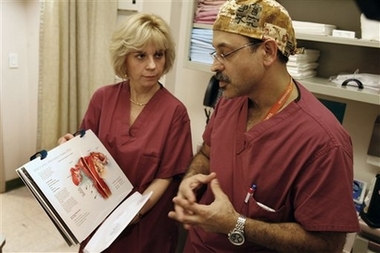Uterus transplant may enable pregnancy
(AP)Updated: 2007-01-16 09:37
A New York hospital is taking steps to offer the nation's first uterus transplant, a radical experiment that might allow women whose wombs were removed or are defective to bear children.
 Drs. Jeanetta Stega and Giuseppe Del Priore discuss their surgical procedures Friday, Jan. 12, 2007 at New York Downtown Hospital in New York. [AP]  |
The hospital's ethics board has conditionally approved the plans, although the hospital's president warned women not to get false hopes because a transplant is not expected "any time in the near future."
Several experts cautioned that much more research must be done, and one declared this bold concept "not really ready for prime time."
The New York doctors just did a six-month trial run, showing that wombs could be obtained from organ donors, and now are screening potential recipients.
"I believe it's technically possible to do," said lead physician Dr. Giuseppe Del Priore.
However, even some scientists involved think they should produce more healthy offspring in animals before trying women.
Others note that about a thousand women already have become pregnant after kidney, heart and other transplants, with generally good results. They view uterus transplants as a way to help women whose only option now for a biological child is through a surrogate mom.
"If this is a passionate desire for a woman who's had surgical removal of a uterus, I would think this would be something she'd really want to pursue," although the risks would have to be carefully weighed, said Julia Rowland, director of the National Cancer Institute's Office of Cancer Survivorship.
The transplant project is being led by Del Priore, a cancer specialist, and Dr. Jeanetta Stega, a gynecologic surgeon, at the New York Downtown Hospital, part of the New York-Presbyterian Health Care system.
Organ transplants usually are performed to save lives, but increasingly they are being done to improve quality of life. Hand transplants and the recent partial face transplant in France are examples.
Besides surgical complications that can prove fatal, the main risk in such operations is the need for lifelong immune-suppressing drugs to prevent organ rejection.
However, if a uterus had to be removed, it would be serious but probably not life-threatening like loss of a liver or heart, proponents say.
A uterus transplant has only been attempted once - in Saudi Arabia in 2000. That womb came from a live donor and had to be removed three months later because of a blood clot. Stega thinks that transplanting more blood vessels and using better anti-clotting drugs would lessen this risk.
Doctors in London and Hungary want to offer such transplants and several are working with Del Priore and Stega. Potential candidates include women born without a uterus, those with abnormal tissue growth called endometriosis, and women who lost a womb to non-cancerous tumors called fibroids.
Del Priore is interested in fertility preservation for cancer survivors.
"Patients ask, 'Can anything else be done?'" he said.
Margaret Cieprisz was one. The Manhattan woman was diagnosed with ovarian cancer at age 38, a few months after she was married.
"The fact that I wasn't going to be able to have
children, it was an unbearable thought to have to accept," she said.
| 1 | 2 |  |
|
||
|
||
|
|